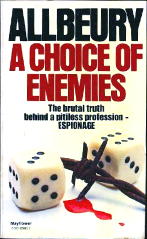Mon 29 Jun 2009
TED ALLBEURY – The Reaper.
Grafton; UK paperback original, 1st printing, 1980. US title: The Stalking Angel. Mysterious Press, hc, 1988; Warner, pb, 1989.

I recently purchased a small collection of spy thrillers written by Ted Allbeury, some British editions, some published in this country. (When this book appeared over here, the title was changed to The Stalking Angel, a modification all to the better, to my way of thinking.)
And not having read anything by the author before now, I picked this one more or less at random. This is in violation of a general principle promulgated by an esteemed colleague of mine, which I usually adhere to, which is to never read a book with a swastika on the cover.
Without getting into the details of the plot, at least not yet, what I discovered was what the book by John Jakes I recently reviewed was missing. Often times you can describe what you see. It’s what’s not there that’s sometimes difficult to put your finger on. Jakes’ book was written strictly in black and white, which I pointed out, although I was referring to films at the time.
Allbeury’s book has the in-between gray that better spy novels seem to thrive on. The moral dilemmas, the idea that “you always pay.” From page 136, former CIA agent Hank Wallace is warning Anna Simon, his protégé with whom he has fallen in love:
A group of aging ex-Nazis, tired of being hunted down and killed, has decided to retaliate, and Anna’s husband, working (unknown to her) for a Jewish organization tracking them down, is one of their first victims.
As the US title then suggests, Anna then begins to take revenge in her own hands. You might think you know exactly where this will lead, and it probably does, but (more than likely) not exactly on the path you think it will.
Being judge, jury and executioner all in one — it’s not the easiest job in the world, and Allbeury does a better than average job of showing us why.
Biographic data:
Ted Allbeury died 4 December 2005. A long obituary I’ve found online contains a wealth of information about him, from which I’ve excerpted the following:

“Ted Allbeury, who has died aged 88, was the most productive of the internationally recognised spy writers of recent years, at one point writing four novels in one year under his own name, plus others under the pen names Richard Butler and Patrick Kelly. […]
“The author of more than 40 novels and numerous radio plays, Ted came to writing late in life (he was 56 when his first book, A Choice of Enemies, appeared in 1973). […]
“A tall, imposing man, with an alert mind and an ease with languages, he served as an SOE intelligence officer from 1940 to 1947, rising to the rank of lieutenant colonel. […]
“Ted’s work was not so much a reaction to other spy fiction writers, but an extension of the work that Deighton and others had begun: first, he wanted to deepen the wartime thriller; and second, he aimed to make unusual common cause with enemy agents as human beings, thus exposing the power relations on both sides as his real target.
Even if you have only a small interest in the British spy novel, the rest of the obituary is well worth your reading.
June 29th, 2009 at 3:34 pm
Far past time for Allbeury to receive due recognition over here. For my money he writes rings around LeCarre’s often obtuse, prolix, and anti-American fictions, plus he has an insiders knowledge of the game and the players (LeCarre’ was a low level Foreign Office bloke who ran a ‘post office drop’, a job reserved for the youngest and least experienced man at the embassy).
For a really good look at some of the best Brit spy fiction then Allbeury would be right at the top of the list with Gavin Lyall, Joseph Hone, Anthony Price, Frederick Forsyth, Colin Forbes, Simon Harvester, Alan Williams, and Len Deighton. Hell of a good writer. He was never as popular over here as he should have been, but did get recognition at home.
June 29th, 2009 at 5:28 pm
I think that Otto Penzler agrees with you, David. He has to be the guy at Mysterious Press who made sure that at least eight of Allbeury’s spy novels were published here in the US. Many of his books never had a US edition.
As for me, the story hasn’t ended well, or at least not yet. I read the one book, boxed up the others, and they’ve been placed in a self-storage unit until I get around to pulling them out again.
Reading this old review of mine made me realize how awfully wrong-headed of me that was. I’ll have to take a run over there soon.
— Steve
July 1st, 2009 at 12:11 am
Actually Otto is the one who turned me onto Allbeury, though I knew the name from a few non fiction works on British spy fiction.
I don’t want to leave the impression that I don’t like LeCarre’, it’s only that I find him tiresome at his worst. He’s an important writer, but his tradecraft is mostly made up whole cloth like his famous terminology (Circus, Control, lamplighers …).
John Bingham, the author and real life spymaster who was the model for LeCarre’s George Smiley but no fan of LeCarre’, was the one who pointed out that it was the George Smiley’s of the world that defected, not the James Bond’s.
At his best LeCarre’ is a major writer and contributor to the spy novel, but he is also capable of incredibly bad books like Naieve and Sentimental Lover and his most recent novel. I bow to no one in my admiration of The Spy Who Came in From the Cold, A Small Town in Germany, the Smiley Trilogy, and some of the others, but few writers have been praised so highly for such clunky prose as LeCarre’ has. Maybe the critics think leaden and dull is ‘important.’
July 1st, 2009 at 7:47 am
I felt immediately that Allbeury was first rate in his field. Sadly, he never got proper attention in America. You may want to look at the search engines for an ominbus edition of five of his novels. It was never published here to my knowledge. The title is Ted Allbeury and the publisher is Octopus Books. I paid perhaps five dollars and there are copies around. He should be revived. John Bingham had the potential to write a great novel but defered out of respect for the agency that employed him.
September 15th, 2010 at 8:20 pm
[…] of Shadows (by George Kelley) The Reaper (by Steve Lewis) […]